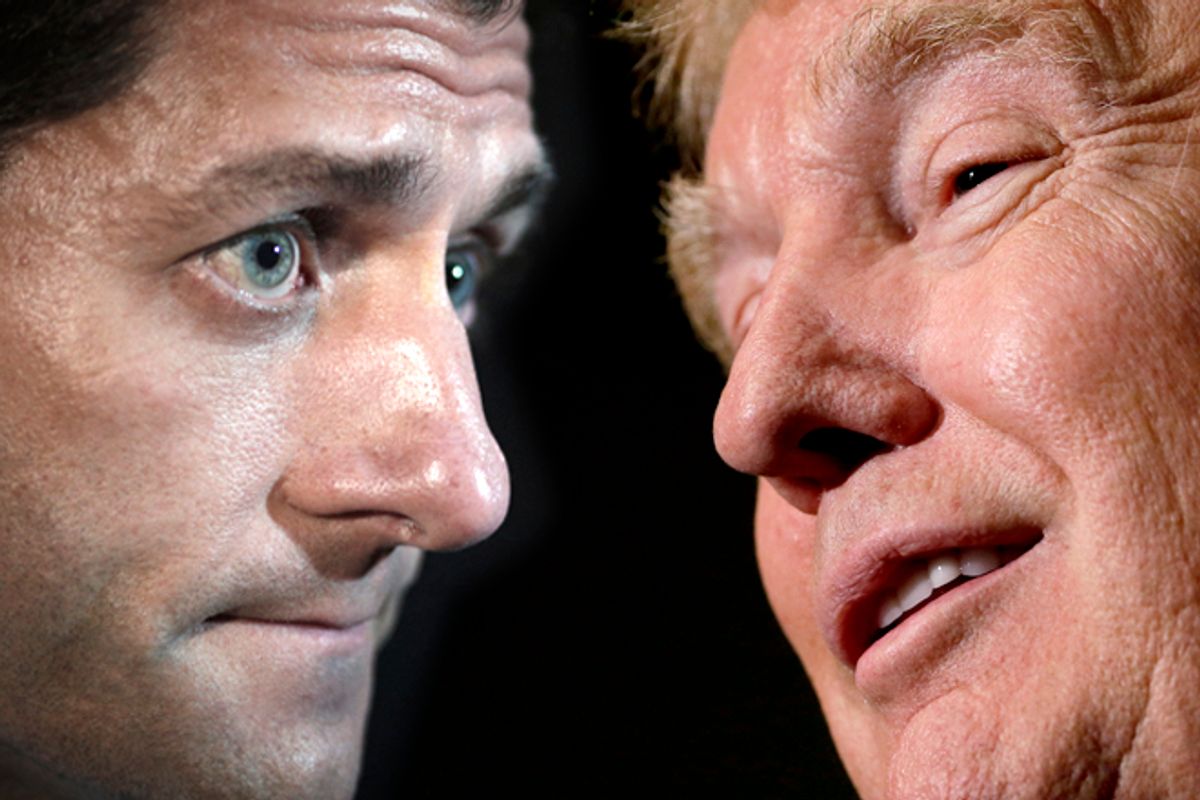Shortly after their first meeting earlier this week, presumptive Republican nominee Donald Trump and House Speaker Paul Ryan issued a joint statement announcing that their encounter was a “very positive step toward unification,” while stating that “the United States cannot afford another four years of the Obama White House, which is what Hillary Clinton represents.” Though Ryan did not endorse the billionaire, saying that it would take more than one meeting, he noted that it is “critical that Republicans unite around our shared principles, advance a conservative agenda, and do all we can to win this fall.”
With the Republican Party currently divided over whether to support Trump -- who has made a campaign out of know-nothing chauvinism, the scapegoating of ethnic and religious minority groups, and impulsive taunting and name-calling of his critics -- one must consider what exactly these “shared principles” really are.
When it comes to Donald, it’s hard to discern any genuine philosophical convictions or principles, other than an unwavering belief in his own greatness. Like Ahab’s monomaniacal fixation on Moby Dick, or Lenin’s single-minded commitment to the revolution, Donald Trump is completely devoted to Donald Trump. And the billionaire will say whatever he thinks will get him votes or attention, however deplorable (not that much unlike his Democratic opponent, come to think of it).
Since locking up the nomination, Trump has flip-flopped on various issues, expressing a willingness to raise taxes on the wealthy, claiming his proposal to ban Muslims from entering the country was “just a suggestion” (no biggie), changing his stance on the minimum wage, and becoming entirely open to accepting checks from big donors, after criticizing his Republican opponents for doing the same over the past year. Sometimes it appears that Trump doesn’t even know what he believes in. (Other than himself, of course.)
Speaker Ryan, on the other hand, is firmly committed to reactionary policies that would sweep away all of the progress made during the 20th century, which makes his agenda even more dangerous than Donald’s. Ryan is more concerned with his right-wing politics than his party, as the New York Times reported on Thursday:
“Those close to Mr. Ryan say he tends to put his policy agenda ahead of party loyalty. ‘People in politics tend to be in two categories,’ said Peter Wehner, a director of the White House Office of Strategic Initiatives under President George W. Bush, who has known Mr. Ryan for two decades. ‘Some are drawn to politics because they like the games and mechanics, and their first priority is the party...Bob Dole fell into that category. Mitch McConnell is also that party guy. And Ryan is just more in that camp of ideas, and he thinks about the party mostly as a vehicle to advance conservatism.’”
Ryan is somewhat infamous for his adolescent infatuation with the anti-collectivist philosophy of Ayn Rand (once described as “nearly perfect in its immorality” by Gore Vidal), which he has yet to outgrow in his middle age. Ryan and his ilk believe in a philosophy akin to social darwinism -- laissez faire capitalism, without any kind of democratic intervention or social programs to limit poverty and inequality. Ironically, the welfare state was originally introduced to save capitalism from itself (and the angry masses), which Randians like Paul do not seem to grasp.
The Republican Party — the party of so-called “conservative principles” — can be broken up into several different sects: the right-wing populists like Trump, who appeal to racial and religious resentments and xenophobia, while spouting anti-intellectual rhetoric; the social darwinists like Paul Ryan and Gov. Scott Walker, who would eliminate the welfare state and all business regulations to set the invisible hand free and usher in a new Gilded Age; the theocrats like Sen. Ted Cruz, Ben Carson and Sen. Jim Inhofe, who believe evolution and global warming are liberal (or satanist) conspiracies; and neocons like Sen. Lindsey Graham and Sen. John McCain, who seem more sensible than their colleagues on domestic issues, but completely insane when it comes to bombing countries in the Middle East and supporting feudalistic
These categories obviously overlap — the GOP is unique in that it manages to promote Jesus Christ, chauvinism and social darwinism all at once. (Say what you will about Ayn Rand, but at least she understood that her individualist philosophy was antithetical to that of Jesus Christ’s.) Since Trump has taken over the party, these differences have become magnified — yet these numerous sects all share the principle of reaction.
As I noted in a previous article, “conservative” is too generous a label for the modern GOP. Leading Republicans do not want to conserve the status quo — like President Obama, for example, who is technically more of a conservative than Trump. The GOP is a party of reactionary politics and right-wing nihilism. True, there are still some moderate Republicans; but in the party of Trump, they are quickly becoming a minority.
In all likelihood, Ryan will end up endorsing Trump, because they are ultimately united in their reactionary outlook. Donald may not have the same commitment as Ryan to anti-collectivist principles, but they are both dedicated to fighting progress, and in the end, this will unify the party.

Shares